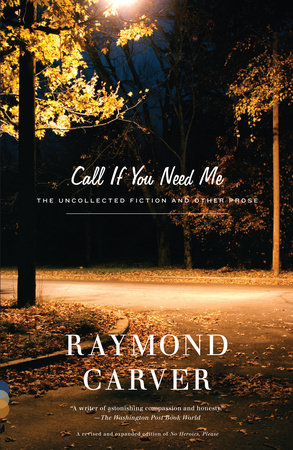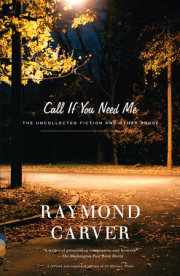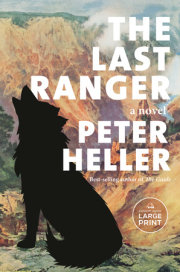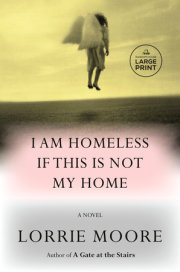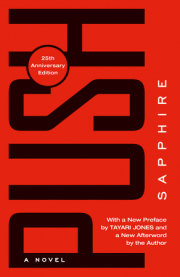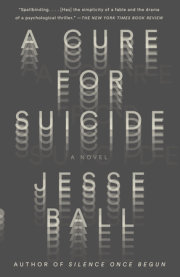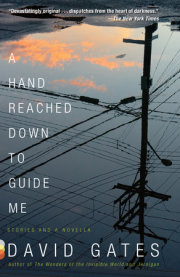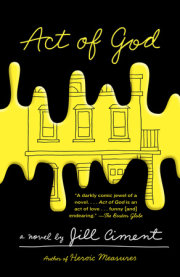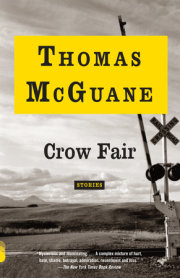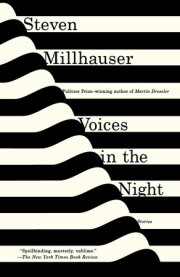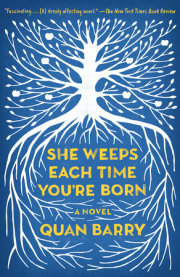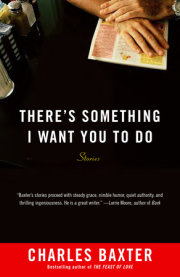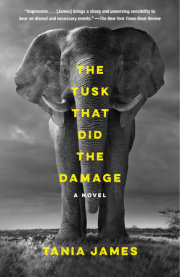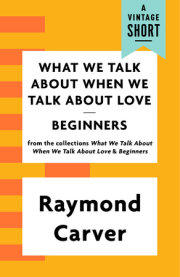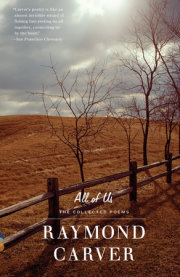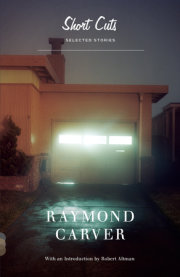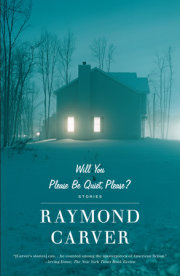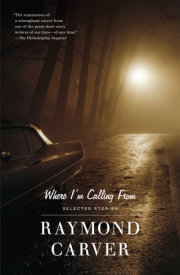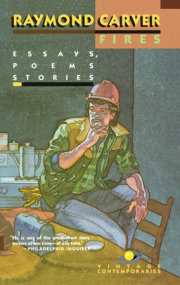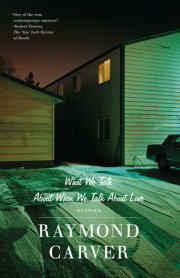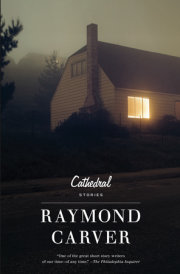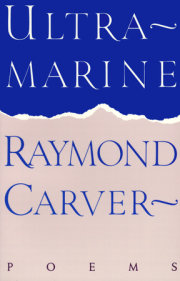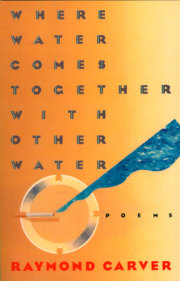Kindling
It was the middle of August and Myers was between lives. The only thing different about this time from the other times was that this time he was sober. He'd just spent twenty-eight days at a drying-out facility. But during this period his wife took it into her head to go down the road with another drunk, a friend of theirs. The man had recently come into some money and had been talking about buying into a bar and restaurant in the eastern part of the state.
Myers called his wife, but she hung up on him. She wouldn't even talk to him, let alone have him anywhere near the house. She had a lawyer and a restraining order. So he took a few things, boarded a bus, and went to live near the ocean in a room in a house owned by a man named Sol who had run an ad in the paper.
Sol was wearing jeans and a red T-shirt when he opened the door. It was about ten o'clock at night and Myers had just gotten out of a cab. Under the porch light Myers could see that Sol's right arm was shorter than his other arm, and the hand and fingers were withered. He didn't offer either his good left hand or his withered hand for Myers to shake, and this was fine with Myers. Myers felt plenty rattled as it was.
You just called, right? Sol said. You're here to see the room. Come on in.
Myers gripped his suitcase and stepped inside.
This is my wife. This is Bonnie, Sol said.
Bonnie was watching TV but moved her eyes to see who it was coming inside. She pushed the button on a device she held in her hand and the volume went off. She pushed it again and the picture disappeared. Then she got up off the sofa onto her feet. She was a fat girl. She was fat all over and she huffed when she breathed.
I'm sorry it's so late, Myers said. Nice to meet you.
It's all right, Bonnie said. Did my husband tell you on the phone what we're asking?
Myers nodded. He was still holding the suitcase.
Well, this is the living room, Sol said, as you can see for yourself. He shook his head and brought the fingers of his good hand up to his chin. I may as well tell you that we're new at this. We never rented a room to anybody before. But it's just back there not being used, and we thought what the hell. A person can always use a little extra.
I don't blame you a bit, Myers said.
Where are you from? Bonnie said. You're not from anywhere around town.
My wife wants to be a writer, Sol said. Who, what, where, why, and how much?
I just got here, Myers said. He moved the suitcase to his other hand. I got off the bus about an hour ago, read your ad in the paper, and called up.
What sort of work do you do? Bonnie wanted to know.
I've done everything, Myers said. He set the suitcase down and opened and closed his fingers. Then he picked up the suitcase again.
Bonnie didn't pursue it. Sol didn't either, though Myers could see he was curious.
Myers took in a photograph of Elvis Presley on top of the TV. Elvis's signature ran across the breast of his white sequined jacket. He moved a step closer.
The King, Bonnie said.
Myers nodded but didn't say anything. Alongside the picture of Elvis was a wedding picture of Sol and Bonnie. In the picture Sol was dressed up in a suit and tie. Sol's good strong left arm reached around Bonnie's waist as far as it would go. Sol's right hand and Bonnie's right hand were joined over Sol's belt buckle. Bonnie wasn't going anywhere if Sol had anything to say about it. Bonnie didn't mind. In the picture Bonnie wore a hat and was all smiles.
I love her, Sol said, as if Myers had said something to the contrary.
How about that room you were going to show me? Myers said.
I knew there was something we were forgetting, Sol said.
They moved out of the living room into the kitchen, Sol first, then Myers, carrying his suitcase, and then Bonnie. They passed through the kitchen and turned left just before the back door. There were some open cupboards along the wall, and a washer and dryer. Sol opened a door at the end of the little corridor and turned on the light in the bathroom.
Bonnie moved up and huffed and said, This is your private bathroom. That door in the kitchen is your own entrance.
Sol opened the door to the other side of the bathroom and turned on another light. This is the room, he said.
I made up the bed with clean sheets, Bonnie said. But if you take the room you'll have to be responsible from here on out.
Like my wife says, this is not a hotel, Sol said. But you're welcome, if you want to stay.
There was a double bed against one wall, along with a nightstand and lamp, a chest of drawers, and a pinochle table with a metal chair. A big window gave out onto the backyard. Myers put his suitcase on the bed and moved to the window. He raised the shade and looked out. A moon rode high in the sky. In the distance he could see a forested valley and mountain peaks. Was it his imagination, or did he hear a stream or a river?
I hear water, Myers said.
That's the Little Quilcene River you hear, Sol said. That river has the fastest per-foot drop to it of any river in the country.
Well, what do you think? Bonnie said. She went over and turned down the covers on the bed, and this simple gesture almost caused Myers to weep.
I'll take it, Myers said.
I'm glad, Sol said. My wife's glad too, I can tell. I'll have them pull that ad out of the paper tomorrow. You want to move in right now, don't you?
That's what I hoped, Myers said.
We'll let you get settled, Bonnie said. I gave you two pillows, and there's an extra quilt in that closet.
Myers could only nod.
Well, good night, Sol said.
Good night, Bonnie said.
Good night, Myers said. And thank you.
Sol and Bonnie went through his bathroom and into the kitchen. They closed the door, but not before Myers heard Bonnie say, He seems okay.
Pretty quiet, Sol said.
I think I'll fix buttered popcorn.
I'll eat some with you, Sol said.
Pretty soon Myers heard the TV come on again in the living room, but it was a very faint sound and he didn't think it would bother him. He opened the window all the way and heard the sound of the river as it raced through the valley on its way to the ocean.
He took his things out of the suitcase and put them away in the drawers. Then he used the bathroom and brushed his teeth. He moved the table so that it sat directly in front of the window. Then he looked at where she'd turned the covers down. He drew out the metal chair and sat down and took a ballpoint out of his pocket. He thought for a minute, then opened the notebook, and at the top of a blank white page he wrote the words Emptiness is the beginning of all things. He stared at this, and then he laughed. Jesus, what rubbish! He shook his head. He closed the notebook, undressed, and turned off the light. He stood for a moment looking out the window and listening to the river. Then he moved to get into bed.
Bonnie fixed the popcorn, salted it and poured butter over it, and took it in a big bowl to where Sol was watching TV. She let him help himself to some first. He used his left hand to good effect and then he reached his little hand over for the paper towel she offered. She took a little popcorn for herself.
What do you make of him? she wanted to know. Our new roomer.
Sol shook his head and went on watching TV and eating popcorn. Then, as if he'd been thinking about her question, he said, I like him all right. He's okay. But I think he's on the run from something.
What?
I don't know that. I'm just guessing. He isn't dangerous and he isn't going to make any trouble.
His eyes, Bonnie said.
What about his eyes?
They're sad eyes. Saddest eyes I ever saw on a man.
Sol didn't say anything for a minute. He finished his popcorn. He wiped his fingers and dabbed his chin with the paper towel. He's okay. He's just had some trouble along the way, that's all. No disgrace attached to that. Give me a sip of that, will you? He reached over for the glass of orange drink she was holding and took some. You know, I forgot to collect the rent from him tonight. I'll have to get it in the morning, if he's up. And I should have asked him how long he intends to stay. Damn, what's wrong with me? I don't want to turn this place into a hotel.
You couldn't think of everything. Besides, we're new at this. We never rented a room out before.
Bonnie decided she was going to write about the man in the notebook she was filling up. She closed her eyes and thought about what she was going to write. This tall, stooped-but handsome!-curly headed stranger with sad eyes walked into our house one fateful night in August. She leaned into Sol's left arm and tried to write some more. Sol squeezed her shoulder, which brought her back to the present. She opened her eyes and closed them, but she couldn't think of anything else to write about him at the moment. Time will tell, she thought. She was glad he was here.
This show's for the birds, Sol said. Let's go to bed. We have to get up in the morning.
In bed, Sol loved her up and she took him and held him and loved him back, but all the time she was doing it she was thinking about the big, curly headed man in the back room. What if he suddenly opened the bedroom door and looked in on them?
Sol, she said, is this bedroom door locked?
What? Be still, Sol said. Then he finished and rolled off, but he kept his little arm on her breast. She lay on her back and thought for a minute, then she patted his fingers, let air out through her mouth, and went off to sleep thinking about blasting caps, which is what had gone off in Sol's hand when he was a teenager, severing nerves and causing his arm and fingers to wither.
Bonnie began to snore. Sol took her arm and shook it until she turned over on her side, away from him.
In a minute, he got up and put on his underwear. He went into the living room. He didn't turn on the light. He didn't need a light. The moon was out, and he didn't want a light. He went from the living room into the kitchen. He made sure the back door was locked, and then he stood for a while outside the bathroom door listening, but he couldn't hear anything out of the ordinary. The faucet dripped-it needed a washer, but then, it had always dripped. He went back through the house and closed and locked their bedroom door. He checked the clock and made sure the stem was pulled. He got into bed and moved right up against Bonnie. He put his leg over her leg, and in that way he finally went to sleep.
These three people slept and dreamed, while outside the house the moon grew large, and seemed to move across the sky until it was out over the ocean and growing smaller and paler. In his dream, someone is offering Myers a glass of Scotch, but just as he is about to take it, reluctantly, he wakes up in a sweat, his heart racing.
Sol dreams that he is changing a tire on a truck and that he has the use of both of his arms.
Bonnie dreams she is taking two-no, three-children to the park. She even has names for the children. She named them just before the trip to the park. Millicent, Dionne, and Randy. Randy keeps wanting to pull away from her and go his own way.
Soon, the sun breaks over the horizon and birds begin calling to each other. The Little Quilcene River rushes down through the valley, shoots under the highway bridge, rushes another hundred yards over sand and sharp rocks, and pours into the ocean. An eagle flies down from the valley and over the bridge and begins to pass up and down the beach. A dog barks.
At this minute, Sol's alarm goes off
Myers stayed in his room that morning until he heard them leave. Then he went out and made instant coffee. He looked in the fridge and saw that one of the shelves had been cleared for him. A little sign was Scotch-taped to it: MR. MYERS SHELF.
Later, he walked a mile toward town to a little service station he remembered from the night before that also sold a few groceries. He bought milk, cheese, bread, and tomatoes. That afternoon, before it was time for them to come home, he left the rent money in cash on the table and went back into his own room. Late that night, before going to bed, he opened his notebook and on a clean page he wrote, Nothing.
He adjusted his schedule to theirs. Mornings he'd stay in the room until he heard Sol in the kitchen making coffee and getting his breakfast. Then he would hear Sol calling Bonnie to get up and then they'd have breakfast, but they wouldn't talk much. Then Sol would go out to the garage and start the pickup, back out, and drive away. In a little while, Bonnie's ride would pull up in front of the house, a horn would toot, and Bonnie would say, every time, I'm coming.
It was then that Myers would go out to the kitchen, put on water for coffee, and eat a bowl of cereal. But he didn't have much of an appetite. The cereal and coffee would keep him for most of the day, until the afternoon, when he'd eat something else, a sandwich, before they arrived home, and then he'd stay out of the kitchen for the rest of the time when they might be in there or in the living room watching TV. He didn't want any conversation.
She'd go into the kitchen for a snack the first thing after she got in from work. Then she'd turn on the TV and wait until Sol came in, and then she'd get up and fix something for the two of them to eat. They might talk on the telephone to friends, or else go sit outside in the backyard between the garage and Myers's bedroom window and talk about their day and drink iced tea until it was time to go inside and turn on the TV. Once he heard Bonnie say to someone on the telephone, How'd she expect me to pay any attention to Elvis Presley's weight when my own weight was out of control at the time?
They'd said he was welcome anytime to sit in the living room with them and watch TV. He'd thanked them but said, No, television hurt his eyes.
They were curious about him. Especially Bonnie, who'd asked him one day when she came home early and surprised him in the kitchen, if he'd been married and if he had any kids. Myers nodded. Bonnie looked at him and waited for him to go on, but he didn't.
Sol was curious too. What kind of work do you do? he wanted to know. I'm just curious. This is a small town and I know people. I grade lumber at the mill myself. Only need one good arm to do that. But sometimes there are openings. I could put in a word, maybe. What's your regular line of work?
Do you play any instruments? Bonnie asked. Sol has a guitar, she said.
I don't know how to play it, Sol said. I wish I did.
Myers kept to his room, where he was writing a letter to his wife. It was a long letter and, he felt, an important one. Perhaps the most important letter he'd ever written in his life. In the letter he was attempting to tell his wife that he was sorry for everything that had happened and that he hoped someday she would forgive him. I would get down on my knees and ask forgiveness if that would help.
After Sol and Bonnie both left, he sat in the living room with his feet on the coffee table and drank instant coffee while he read the newspaper from the evening before. Once in a while his hands trembled and the newspaper began rattling in the empty house. Now and then the telephone rang, but he never made a move to answer it. It wasn't for him, because nobody knew he was here.
Through his window at the rear of the house he could see up the valley to a series of steep mountain peaks whose tops were covered with snow, even though it was August. Lower down on the mountains, timber covered the slopes and the sides of the valley. The river coursed down the valley, frothing and boiling over rocks and under granite embankments until it burst out of its confines at the mouth of the valley, slowed a little, as if it had spent itself, then picked up strength again and plunged into the ocean. When Sol and Bonnie were gone, Myers often sat in the sun in a lawn chair out back and looked up the valley toward the peaks. Once he saw an eagle soaring down the valley, and on another occasion he saw a deer picking its way along the riverbank.
He was sitting out there like that one afternoon when a big flatbed truck pulled up in the drive with a load of wood.
You must be Sol's roomer, the man said, talking out the truck window.
Myers nodded.
Sol said to just dump this wood in the backyard and he'd take care of it from there.
I'll move out of your way, Myers said. He took the chair and moved to the back step, where he stood and watched the driver back the truck up onto the lawn, then push something inside the cab until the truck bed began to elevate. In a minute, the six-foot logs began to slide off the truck bed and pile up on the ground. The bed rose even higher, and all of the chunks rolled off with a loud bang onto the lawn.
The driver touched the lever again and the truck bed went back to its normal place. Then he revved his engine, honked, and drove away.
What are you going to do with that wood out there? Myers asked Sol that night. Sol was standing at the stove frying smelt when Myers surprised him by coming into the kitchen. Bonnie was in the shower. Myers could hear the water running.
Why, I'm going to saw it up and stack it, if I can find the time between now and September. I'd like to do it before the rain starts.
Maybe I could do it for you, Myers said.
You ever cut wood before? Sol said. He'd taken the frying pan off the stove and was wiping the fingers of his left hand with a paper towel. I couldn't pay you anything for doing it. It's something I was going to do anyway. Just as soon as I get a weekend to my name.
I'll do it, Myers said. I can use the exercise.
You know how to use a power saw? And an ax and a maul?
You can show me, Myers said. I learn fast. It was important to him that he cut the wood.
Sol put the pan of smelt back on the burner. Then he said, Okay, I'll show you after supper. You had anything to eat yet? Why don't you have a bite to eat with us?
I ate something already, Myers said.
Sol nodded. Let me get this grub on the table for Bonnie and me, then, and after we eat I'll show you.
I'll be out back, Myers said.
Sol didn't say anything more. He nodded to himself, as if he was thinking about something else.
Myers took one of the folding chairs and sat down on it and looked at the pile of wood and then up the valley at the mountains where the sun was shining off the snow. It was nearly evening. The peaks thrust up into some clouds, and mist seemed to be falling from them. He could hear the river crashing through the undergrowth down in the valley.
I heard talking, Myers heard Bonnie say to Sol in the kitchen.
It's the roomer, Sol said. He asked me if he could cut up that load of wood out back.
How much does he want to do it? Bonnie wanted to know. Did you tell him we can't pay much?
I told him we can't pay anything. He wants to do it for nothing. That's what he said, anyway.
Nothing? She didn't say anything for a time. Then Myers heard her say, I guess he doesn't have anything else to do.
Later, Sol came outside and said, I guess we can get started now, if you're still game.
Myers got up out of the lawn chair and followed Sol over to the garage. Sol brought out two sawhorses and set them up on the lawn. Then he brought out a power saw. The sun had dropped behind the town. In another thirty minutes it would be dark. Myers rolled down the sleeves of his shirt and buttoned the cuffs. Sol worked without saying anything. He grunted as he lifted one of the six-foot logs and positioned it on the sawhorses. Then he began to use the saw, working steadily for a while. Sawdust flew. Finally he stopped sawing and stepped back.
You get the idea, he said.
Myers took the saw, nosed the blade into the cut Sol had started, then began sawing. He found a rhythm and stayed with it. He kept pressing, leaning into the saw. In a few minutes, he sawed through and the two halves of the log dropped onto the ground.
That's the idea, Sol said. You'll do, he said. He picked up the two blocks of wood and carried them over and put them alongside the garage.
Every so often-not every piece of wood, but maybe every fifth or sixth piece-you'll want to split it with the ax down the middle. Don't worry about making kindling. I'll take care of that later. Just split about every fifth or sixth chunk you have. I'll show you. And he propped the chunk up and, with a blow of the ax, split the wood into two pieces. You try it now, he said.
Myers stood the block on its end, just as Sol had done, and he brought the ax down and split the wood.
That's good, Sol said. He put the chunks of wood by the garage. Stack them up about so high, and then come out this way with your stack. I'll lay some plastic sheeting over it once it's all finished. But you don't have to do this, you know.
It's all right, Myers said. I want to, or I wouldn't have asked.
Sol shrugged. Then he turned and went back to the house. Bonnie was standing in the doorway, watching, and Sol stopped and reached his arm around Bonnie, and they both looked at Myers.
Myers picked up the saw and looked at them. He felt good suddenly, and he grinned. Sol and Bonnie were taken by surprise at first. Sol grinned back, and then Bonnie. Then they went back inside.
Myers put another piece of wood on the sawhorses and worked awhile, sawing, until the sweat on his forehead began to feel chill and the sun had gone down. The porch light came on. Myers kept on working until he'd finished the piece he was on. He carried the two pieces over to the garage and then he went in, used his bathroom to wash up, then sat at the table in his room and wrote in his notebook. I have sawdust in my shirtsleeves tonight, he wrote. It's a sweet smell.
That night he lay awake for a long time. Once he got out of bed and looked out the window at the mound of wood which lay in the backyard, and then his eyes were drawn up the valley to the mountains. The moon was partially obscured by clouds, but he could see the peaks and the white snow, and when he raised his window the sweet, cool air poured in, and farther off he could hear the river coursing down the valley.
The next morning it was all he could do to wait until they'd left the house before he went out back to begin work. He found a pair of gloves on the back step that Sol must have left for him. He sawed and split wood until the sun stood directly over his head and then he went inside and ate a sandwich and drank some milk. Then he went back outside and began again. His shoulders hurt and his fingers were sore and, in spite of the gloves, he'd picked up a few splinters and could feel blisters rising, but he kept on. He decided that he would cut this wood and split it and stack it before sunset, and that it was a matter of life and death that he do so. I must finish this job, he thought, or else . . . He stopped to wipe his sleeve over his face.
By the time Sol and Bonnie came in from work that night-first Bonnie, as usual, and then Sol-Myers was nearly through. A thick pile of sawdust lay between the sawhorses, and, except for two or three blocks still in the yard, all of the wood lay stacked in tiers against the garage. Sol and Bonnie stood in the doorway without saying anything. Myers looked up from his work for a minute and nodded, and Sol nodded back. Bonnie just stood there looking, breathing through her mouth. Myers kept on.
Sol and Bonnie went back inside and began on their supper. Afterward, Sol turned on the porch light, as he'd done the evening before. Just as the sun went down and the moon appeared over the mountains, Myers split the last chunk and gathered up the two pieces and carried the wood over to the garage. He put away the sawhorses, the saw, the ax, a wedge, and the maul. Then he went inside.
Sol and Bonnie sat at the table, but they hadn't begun on their food.
You better sit down and eat with us, Sol said.
Sit down, Bonnie said.
Not hungry just yet, Myers said.
Sol didn't say anything. He nodded. Bonnie waited a minute and then reached for a platter.
You got it all, I'll bet, Sol said.
Myers said, I'll clean up that sawdust tomorrow.
Sol moved his knife back and forth over his plate as if to say, Forget it.
I'll be leaving in a day or two, Myers said.
Somehow I figured you would be, Sol said. I don't know why I felt that, but I didn't think somehow when you moved in you'd be here all that long.
No refunds on the rent, Bonnie said.
Hey, Bonnie, Sol said.
It's okay, Myers said.
No it isn't, Sol said.
It's all right, Myers said. He opened the door to the bathroom, stepped inside, and shut the door. As he ran water into the sink he could hear them talking out there, but he couldn't hear what they were saying.
He showered, washed his hair, and put on clean clothes. He looked at the things of his in the room that had come out of his suitcase just a few days ago, a week ago, and figured it would take him about ten minutes to pack up and be gone. He could hear the TV start up on the other side of the house. He went to the window and raised it and looked again at the mountains, with the moon lying over them-no clouds now, just the moon, and the snowcapped mountains. He looked at the pile of sawdust out in back and at the wood stacked against the shadowy recesses of the garage. He listened to the river for a while. Then he went over to the table and sat down and opened the notebook and began to write.
The country I'm in is very exotic. It reminds me of someplace I've read about but never traveled to before now. Outside my window I can hear a river and in the valley behind the house there is a forest and precipices and mountain peaks covered with snow. Today I saw a wild eagle, and a deer, and I cut and chopped two cords of wood.
Copyright © 2000 by Tess Gallagher. All rights reserved. No part of this excerpt may be reproduced or reprinted without permission in writing from the publisher.

